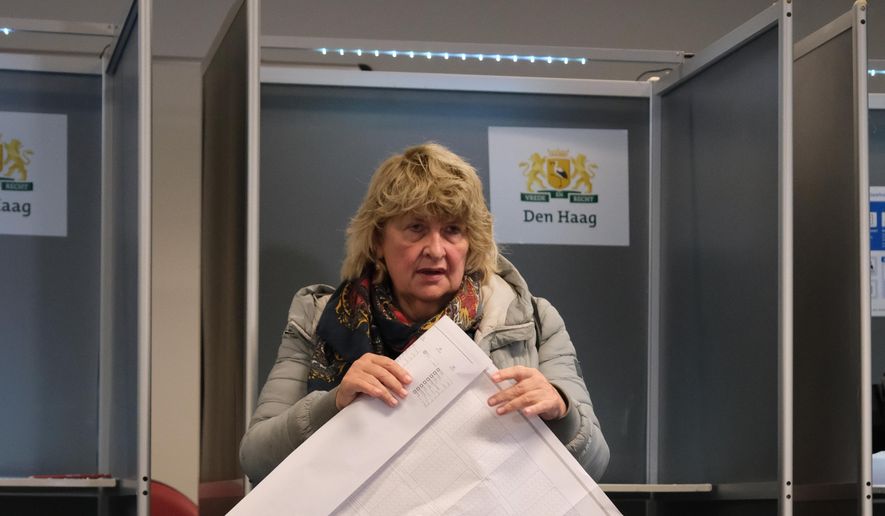THE HAGUE, Netherlands — Dutch voters in Wednesday’s general election were spoiled for choice.
The country’s electoral commission has registered no fewer than 27 parties and 1,166 candidates vying for the 150 seats up for grabs in the House of Representatives.
That means a big ballot paper because it bears the names of all the parties and the candidates on each party’s list. Voters wrangle big ballots and use small red pencils to mark them before folding them up and squeezing them through a slot in the ballot box. When polling booths close, vote counters have to unfold the sheets all over again to tally the results.
It would be “ideal” if the ballots could be made smaller, Marcel Roelofsen told The Associated Press just after he cast his vote in The Hague.
On Wednesday, a polling station worker in The Hague used an L-shaped metal tool inserted through the slot to tamp down the papers in one of the locked ballot boxes, which look like modified plastic garbage containers that stand in the front gardens of most Dutch homes. Unlike garbage containers, the ballot boxes have a slot in the lid and a lock that is only to be opened once voting has finished and the ballots need to be counted.
The unwieldy sheet has become such an issue that this year that five municipalities are experimenting with streamlined smaller ballot papers. They include a list of parties and numbers, while candidate names and their numbers are on a separate poster in voting booths.
“It was actually quite big when I opened it so I had to look carefully to make sure I didn’t do anything wrong,” Layla Balounsi said after she voted.
The size of the ballot paper is a potent symbol for the fragmentation of Dutch politics in an age of increasingly deep divisions in society, but it’s not a new phenomenon.
There have long been many parties in Dutch politics, but in the past a few big names took the lion’s share of votes, making coalition forming easier. In 1986, for example, 27 parties were on the ballot and nine won at least one seat, but three parties - the Christian Democrats, Labor Party and center-right People’s Party for Freedom and Democracy - dominated with 54, 52 and 27 seats, respectively.
This year’s vote looks close, according to polls, with the far-right Party for Freedom led by anti-Islam lawmaker Geert Wilders on course to win for the second successive election, but center-left and center-right parties are also in contention.
All a party needs to do to get on the ballot is pay a deposit of 11,250 euros ($13,077) and collect 580 declarations of support.
Not everyone thinks the hefty ballots are a problem.
“I think it is so good that we have so many parties,” Arthur Swanevelt said. He was voting in The Hague for one of two pro-animal rights parties.
To determine who gets seats, the electoral commission adds up all the valid votes and divides them by the 150 seats. For example, in 2023 there were 10,432,726 valid votes, meaning that any party that garnered 69,551 or more got a seat. That was good news for the populist JA21, which got 71,345 votes and one seat, but less so for BVNL / Groep Van Haga that polled 52,913 votes and came away empty-handed.
The large number of options translates into a plethora of parties in parliament. When the last four-party coalition government collapsed earlier this year, there were 15 parties in the House of Representatives.
That, in turn, makes forming a coalition increasingly difficult. Talks to cobble together a government that can command a majority can take months.




Please read our comment policy before commenting.